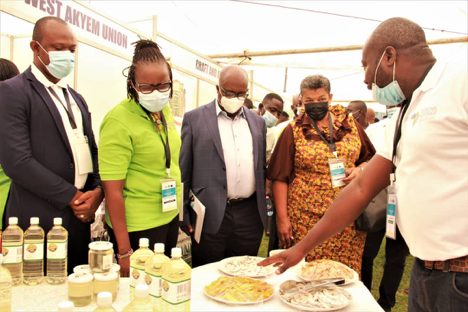Mr. Patrick Nimo, the Chief Director of the Ministry of Trade, has lauded Fairtrade for its contribution to supporting farmers’ access to trade and markets, both within the sub-region and beyond.
He urged producers to take advantage of the National Export strategy for export promotion and trade facilitation, as agriculture forms a major part of non-traditional exports.
Fairtrade Africa West Africa Network, this week organised a two-day Regional Convention from the 13th to 14th June 2021 under the theme ‘Building Producer Resilience through trade’ that was attended by Mr. Patrick Nimo, Chief Director of the Ministry of Trade; Ms. Gizella Tetteh, the MP of Awutu Senya; as well as representatives from Ghana Cocobod, the Ministry of Agriculture, Cocoa Research Institute of Ghana, GIZ, agricultural workers’ unions and other partner organisations.
The West Africa Regional Fairtrade Convention (RFC) is a biennial event organised to bring together all Fairtrade and non-Fairtrade producers, and other stakeholder within and outside the region, to deliberate on contemporary issues affecting producers and to propose ways of advancing the businesses of producers and their partners.
They deliberated on new market opportunities, linkages with entrepreneurs in agri-processing as well as issues that relate to advocacy, youth and gender-related issues within agricultural supply chains.
The event focused on the resilience of producers in a post-Covid context. With the onset of COVID-19, producers have been supported by Fairtrade to build resilience on different fronts.
Speaking on behalf of producers, Mrs. Florence Blankson – Vice President of the Fairtrade Ghana Network said: “The support received from Fairtrade came in handy during the lockdown period, as markets were virtually closed down due to restrictions on movement”.
Over 50,000 households received support in the form of food, hand-sanitisers, soap and facemasks. It is worth noting that Fairtrade also gave some concessions in relation to the use of Fairtrade premium by members and workers, in order to make funds available to producer organisations for specific support initiatives toward their members and workers.
It provided relief and resilience funds through internally generated funds from the Fairtrade system, and also through donor partners, which helped producers to identify alternative livelihoods as well as build their capacity in areas such as climate adaptation and regenerative agriculture.
Through the Fairtrade Relief fund, SECO fund and Recover Africa Fund, both Hired Labour organisations and Small Producer Organisations were able to access financial support to respond to the needs of their members and workers.
The SECO Fund, Fairtrade COVID-19 Relief Fund and Recover Africa Fund were structured to support producer organisations in offering relief services, such as the provision of hygiene and safety kits as well as food items to members and workers.
The Recover Africa Fund in particular was also made available for producers to access in order to build their resilience in livelihoods and other income-generation activities.
Great initiatives such as the establishment of hydroponics on farms, bakeries, soap-making, bead-making and vegetable production were just a few of the innovations embarked upon by the producer organisations through use of the fund.
Edward Akapire, Head of Region for Fairtrade Africa West Africa, reiterated the commitment of Fairtrade to strengthen its member producer organisations: “The West Africa Fairtrade Network has over the period mobilised its members to access capacity building on various topics relevant to our operations as farmers and workers, supported in the area of fundraising, and engaged policymakers in an attempt to achieve favourable terms for producers”.
Dr. Nyagoy Nyong’o, Fairtrade CEO, reiterated Fairtrade’s commitment to empowering and supporting producers to remain resilient.
She also assured producers of Fairtrade’s commitment to ensuring fairness in trade, advocating for living incomes, and advocating for human rights and sustainable development – in with line with the new 2021-2025 global strategy that puts the producer at the heart of all transformation and which focuses on digitalisation, impact data, transparency and traceability that is needed to drive agricultural growth.
Fairtrade Africa, a member of the wider International Fairtrade movement, represents Fairtrade-certified producers in Africa and the Middle East.










